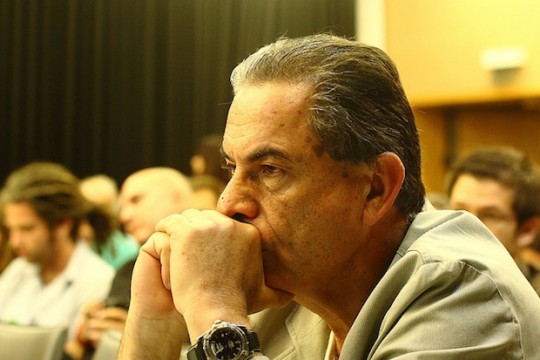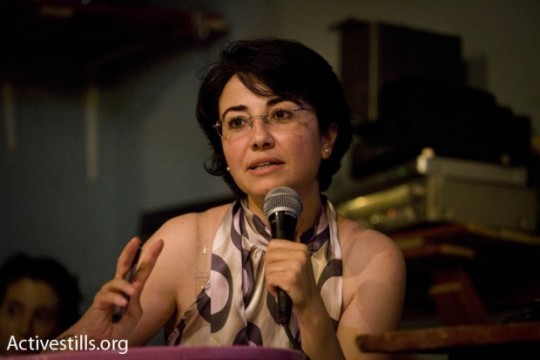One of the side effects of Operation Protective Edge has been a dramatic narrowing of the political conversation in Israel. The author aggregates all the major incidents during the Gaza War in which freedom of speech in Israel was curtailed, often violently.
By Orli Santo
An entire spectrum of formerly acceptable left-leaning opinions and sentiments – from defending Palestinians’ human rights to merely empathizing with their suffering – has become taboo. In the past two months people who publicly expressed such opinions were beaten on the streets, derogated in the media, threatened, boycotted, and fired from their jobs. Lawmakers who sided with the Palestinian cause were removed from the podium or suspended from the plenum, while the laws defending their democratic right to do so are now being redrawn to prevent and punish such actions in the future.
Below is a list of the significant violations – committed by populist movements, by employees, by government entities and by the Israeli parliament itself – against left-leaning individuals’ and organizations’ freedom of speech. Grouping theses incidents shows the alarming scope of this phenomenon. While it is impossible to gauge the lasting effects it will have on Israel’s integrity as a democracy, it’s safe to presume that it will be felt in the future.
Anti-war protesters
Violence in Tel Aviv
On July 12, four days into Israel’s military offensive in Gaza, Israeli anti-war demonstrators in Tel Aviv were beaten by violent nationalist counter-demonstrators.
+972 reported that a large peace rally in Tel Aviv was countered by a smaller pro-war protest, shouting “Death to Arabs” and “Death to Leftists.” Police forces initially separated the two groups, but a missile siren caused most policemen to desert the scene, leaving the pacifists to fend for themselves.
“One man had a chair broken over his head and was evacuated to the hospital, along with a man who was punched in the head and another punched in the eye. One had his video camera taken. Dozens were beaten, shoved to the ground or pelted with eggs. Some testified that they were sprayed with tear gas,” wrote +972’s Haggai Matar, who narrowly escaped the attack himself.
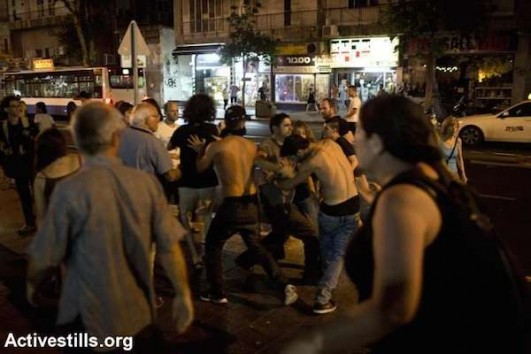
Violence in Haifa
On July 17, anti-war protestors in the ethnically mixed city of Haifa were beaten by nationalist counter-demonstrators who burned a Palestinian flag and shouted “Death to Arabs.”
Among the dozens of leftists injured that day were the Arab deputy mayor of Haifa, Dr. Suhail Assad, and his son, who was reportedly attacked for looking like an Arab. While trying to shield his son, the deputy mayor was struck on his head, and fell to the ground. They were saved by the intervention of two Israeli women, and taken to the hospital for medical attention. “Luckily he [the son] didn’t fall down; otherwise they would have finished him off,” Assad told Haaretz.
The following day in Haifa violent clashes erupted between hundreds of Palestinian citizens of Israel and the police; thirty protestors were arrested. MK Haneen Zoabi of the Balad party was briefly handcuffed. According to the police, she attacked an officer.
At the same time, Palestinian residents of East Jerusalem clashed with the police, causing further violent escalation.
In the wake of these events, Minister of Internal Security Yitzhak Aharonovich told Army Radio that he intended to seek legal measures to prohibit any further protests against the war. “There is no left and right here – we need to unite as a country and support the IDF soldiers who are fighting,” he declared.
Violence in Tel Aviv, again
A particularly large Israeli anti-war protest took place in Tel Aviv on the evening of July 26, where 4,000-5,000 left-leaning demonstrators gathered in Kikar Rabin and were met by several hundred right-wing demonstrators. Police forces kept the two groups apart for the duration of the event. Afterwards, though, while leaving the square, several demonstrators were chased down and attacked. Right-wingers used metal batons, rods and pepper spray to attack anti-war demonstrators. At least eight people were beaten and needed medical attention, while eight nationalist protesters were detained by the police.
“I don’t blame the police alone,” one of injured protestors, who was hit on the head with a metal rod, told Sicha Mekomit. “The political system here takes it in stride that there are thousands of people in the streets, shouting ‘Death to Arabs’ and ‘Death to the Leftists’… Things that were not legitimate in the past have now become legitimate.”
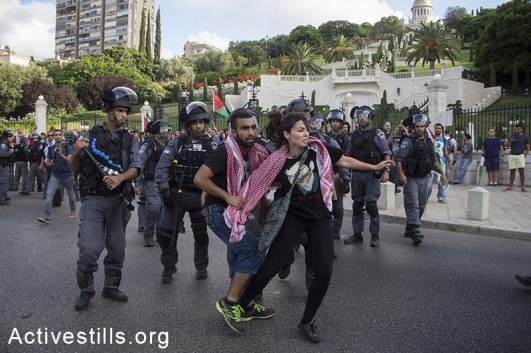
Public figures
Threatened for showing empathy
On July 9, day 2 of Operation Protective Edge, Gila Almagor, one of Israel’s most widely revered movie and theater actresses, received a death threat.
Almagor was profiled earlier that week in a Yedioth Ahronoth article disastrously titled ”I am Ashamed to be an Israeli.”
“I never said that I was ashamed to be an Israeli,” she later told Israeli Channel 2 news, explaining that the paper misquoted her comment regarding the murder of Palestinian teen Mohammed Abu Khdeir. “But once the article was published, an ambush started on my phone,” she explained. The following day Habima theater received a message warning that if Almagor performed that night, she would be murdered as she came off stage. She stayed at home.
That same week, in an interview with Israeli Channel 10, comedian-actress Orna Banai said she felt bad about the already-high death toll of the war. “Bibi should hold it,” she said. “We all are suffering from this situation. Us and the Palestinians. On their side women and children were killed today, and it makes me feel terrible.”
The interview ended with her talking about her dog: “I’m this trippy lefty, who likes dogs and Arabs,” she joked. Her comments evoked such public outrage that Banai was fired from her position as the spokesperson for cruise ship operator Mano Maritime. To deal with the threats and insults pouring in, she had to close down her social media accounts.
Threatened for being a Leftist
Yonit Levi, an anchor for Channel 2 news, received numerous death threats on social media for her perceived leftist stance. She did not speak against the operation.
Amnon Abramovitch, a Channel 2 news commentator, had to be rescued after at least 100 right-wing rioters wrapped in Israeli flags surrounded the Channel 2 studio and shouted at him “Traitor,” “Terrorist,” and “It’s a shame you didn’t die in the war.”
Abramovitch, a decorated war hero who was severely maimed in the Yom Kippur War while operating a burning tank, had to be escorted from the studios by a police force. Ironically, Abramovitch had spoken in support of the operation.
Threatened for no reason
Beram Kayal, a Palestinian-Israeli soccer player on Israel’s national team, posted a picture of himself on Instagram. It was a picture from Israel’s game against Scotland, and behind Kayal, in the blurred background, one could make out members of the crowd waiving Palestinian flags. The fact that the flags had nothing to do with him did little to assuage public outrage. “Many [fans] expressed outrage over his connection to Israel’s team, and called to disqualify him from representing the state,” an Israeli sports channel reported [Hebrew].
A few days later singer Rona Kenan canceled her scheduled performance in Haifa after receiving a series of death threats. Her antagonists alleged that back in 2012 she had asked for a moment of silence in the memory of Palestinian terrorists. Kenan says no such thing happened. “I find myself exposed to harsh verbal attacks and threats on my life, just because of false accusations,” she told Haaretz.
Threatened for speaking their minds
Public figures who actually did speak out against the war fared much worse. Haaretz columnist Gideon Levy published an op-ed criticizing Israeli combat pilots for killing innocents, and praising soldiers who refused such orders. In the following days, the mainstream media denounced him as a traitor, legal organizations called to sue him for incitement, and he received so many death threats that Haaretz had to hire a bodyguard for him.
MK Yariv Levin, chairman of the governing coalition, called to try Levy for treason. “When someone who lives among you turns himself into an enemy mouthpiece, while spreading lies, out of the hope that this will undermine your ability to wage war – this is called, in simple Hebrew, ‘treason,’” the chairman explained on Channel 2 news.
“The reason I no longer write in the papers is that I’m afraid that someone will grab me on the street and beat me,” Natan Zach, one of Israel’s best-known poets, told the Hebrew website Walla in an interview.
Social media
Punishing employees for Facebook posts
Operation Protective Edge reportedly heralded a new phenomenon on social media: Facebook groups that track down outspoken leftists and “out” them to their employers. Members of these groups then flood an employer with angry calls and emails, demanding the culprit’s dismissal.
From the start of the operation dozens of Palestinian citizens of Israel were fired or suspended from their jobs over statements they made on Facebook.
An Arab municipal worker in the city of Lod was fired for writing on her Facebook wall “13 [IDF soldiers] dead, may they be more, Amen.” An Arab employee of the Safed municipality was suspended for posting that “Zionism is the enemy of humanity… We are all Palestine.” A doctor and a nurse, from two different hospitals, were suspended for denouncing the IDF as “murderers of children.” An Arab physiotherapist of the Bnei Yehuda soccer team was fired for relatively mild denunciations, such as “some people in this country are becoming worse than monsters.”
The list goes on. A franchisee of the Tiv Ta’am food company and an employee of the metalworking company Iscar were fired for expressing joy over the death of IDF soldiers. A Bank Hapoalim employee was fired for wishing for another holocaust. Two employees of the supermarket chain Supersal are facing pre-termination disciplinary hearings for making anti-Israel statements. For condemning Israel’s actions on Facebook, a Hadassah College student in Jerusalem was removed from the valedictorian list, and her scholarship was revoked.
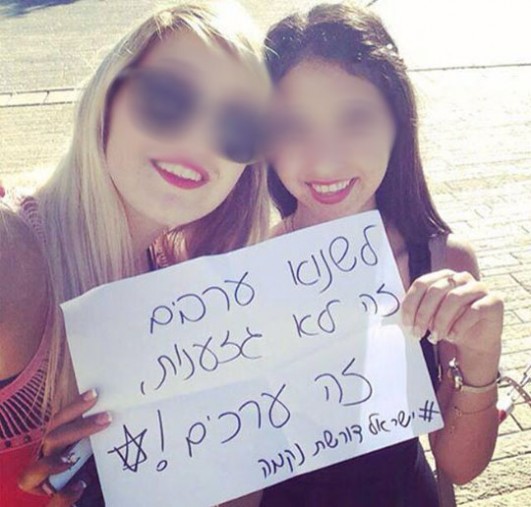
“A saying by an employee, even if it’s extreme and defiant, can’t in itself become an automatic reason for his firing,” Steve Adler, former judge of Israel’s national labor court, told the The Marker. “If the employee was speaking only in his own name, with no relation to the company that employs him – say on his Facebook page – the conclusion is clear: Even if he said words of enmity that are hard to hear, he is allowed to say them… There is no legal basis to fire him.”
An Arab nurse suspended from the state-owned Sheba Medical Center for a Facebook post calling IDF soldiers war criminals, appealed to the Tel Aviv labor court. One day before the court hearing the hospital reinstated him, on condition that he remove the offensive post and apologize to the hospital’s administration.
An Arab accountant at Ernst & Young was also threatened with dismissal for calling Israeli broadcasters who interrupted an Arab interviewee “stupid Nazis.” She, too, was allowed to return to work once she removed the post and publicly apologized for it.
Unlike private companies, state bodies do have the right to fire employees for their public statement if they incite racial or nationalistic violence. While state bodies used this right liberally on Arab employees lashing out at Israel, no similar application was made for nationalistic, anti-Palestinian statements.
Mynet reported that a postal employee wrote on her Facebook page, “All lefties to the gas chambers now.” A complaint against her was answered with: “Israel is a democratic country, where every citizen is allowed to express his opinion.”
Complaints against a Carmiel municipal employee who wrote “Only a thousand… we should have killed them all, death to all Arabs,” were also shrugged off. “We have no control over what people say in the arena of Facebook, and we don’t follow employees’ private Facebook pages… [but] we will talk to him,” the municipality promised.
An Israeli professor at Bar-Ilan University sent his students an email rescheduling a test, and took the opportunity to express sympathy and concern for all victims of the fighting. He made no reference to the victims’ nationality, implicitly reminding the students that the majority of the victims were Gazans.
After receiving vociferous complaints about the professor’s message, the university issued an apology for the email and the professor was reprimanded.
Israeli parliament
Seeking new legal limitations
Last month right-leaning parliamentarians proposed an amendment to the Knesset rules that would narrow elected representatives’ freedom of speech. The new law would allow impeaching those MK’s whose expressions are deemed out of line.
The current law allows the Knesset’s Central Election Committee to prevent certain parties from participating in elections if it is able to prove that a party supported the armed struggle against Israel. The new amendment to this law proposes to also enforce it on representatives already elected, so that acting members of parliament who “published words of support of the armed struggle of an enemy state or a terrorist organization against Israel” may be voted out of the Knesset. The law implicitly targets Arab MKs, since those who determine exactly what constitutes “support of the armed struggle” would be no other than the rival MKs themselves.
Calling for boycotts
On July 21, Foreign minister Avigdor Lieberman called on his supporters to boycott Arab businesses that went on strike in solidarity with residents of the Gaza Strip. He also demanded that the Al Jazeera in Israel be shut down. “Al Jazeera has become an integral part of the terrorist organizations’ information campaign,” he said in a press conference.
Minister of Communications Gilad Erdan joined his call, asking the committee of cable and satellite broadcasts to stop broadcasting “the network’s incitement against Israel.”
Since the minister brought no examples of actual false or inaccurate reports by Al Jazeera, the cable committee dismissed the request. “The facts presented to the committee supply no reason to remove the channel,” was the response given.
Crushing dissent
MK Haneen Zoabi, an outspoken and controversial member of the Arab Balad party, was suspended from the Knesset for six months over comments that were deemed “incitement against the state.”
Over the past weeks, Zoabi has drawn public outrage for her controversial actions and expressions in defense of Palestinian. Before it was known that the three kidnapped Israeli teens had been murdered, Zoabi defended their kidnappers on Radio Tel Aviv. “They are not terrorists,” she explained, “they are people who see no way to change their reality, and are forced to use these means until Israel sobers up a little… sobers up and feels the suffering of the other.” She added that she did not approve of their actions.
For this and other remarks made by Zoabi, Speaker of the Knesset Yuli Edelstein filed a complaint with the Knesset’s Ethics Committee, accusing Zoabi of “comments that border incitement, encourage violence and support terror organizations.”
At the beginning of August the Ethics Committee voted to suspend Zoabi, removing her for six months from the plenum and the committees on which she serves, though still allowing her to vote (silently). The committee reasoned that Zoabi’s remarks were inconsistent with the good of the country.
“The Israeli public, like in any other state, expects that members of parliament, who have sworn allegiance to the state, would not encourage those who rise against it, and those who seek to kill its citizens and its soldiers,” the decision read.
“The committee, instead of protecting my freedom of speech… is vigorously acting to punish me for my positions, and punish the entire public that I represent,” Zoabi said in reply. She added that she would appeal the decision in the Supreme Court.
Ami Ayalon, former head of the Shin Bet and a former Labor MK, berated the Ethics Committee’s decision. “In the sea of inappropriate expressions [in the Knesset], some of which are racist and some of which are outright criminal, there’s a grave injustice in the persecution of Haneen Zoabi,” he wrote in a recent op-ed. “The committee’s decision damages freedom of speech, which is the heart and soul of democracy.”
Later on it was decided to also strip Zoabi of parliamentary immunity and open a criminal investigation against her, on the suspicion that she incited violence and insulted a police officer. The police recommended putting her on trial for incitement.
Even right-leaning MK’s expressed dismay over this. “The police investigation against MK Zoabi is a grave issue, one that all MK’s should be revolting against,” Moshe Feiglin, a veteran MK of the Likud party, wrote on his Facebook page. “Zoabi is representing her voters… Today she is being investigated over activities and comments that are part of her political duties and agenda. Today the police are investing her, tomorrow it will be Miri Regev [Likud].”
Orli Santo is a correspondent for the New York-based weeklies Yediot America and the Jewish Week. Her writing has also been published by the Times of Israel, Ynet, the JTA and other publications.
Related:
What was different about this war?
Not just escalation: A frightening new era of Jewish-Arab relations in Israel
Why Palestinian citizens of Israel are no longer safe

